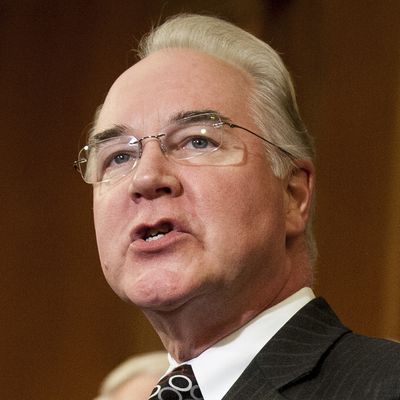
During the campaign, Donald Trump was so committed to doing away with Obamacare that he promised to “ask Congress to convene a special session so we can repeal and replace” the Affordable Care Act, though that is both unnecessary and not in his power. Days after the election, when faced with the massive challenge of undoing Obamacare without leaving millions uninsured, Trump changed his tune, suggesting that he might keep some provisions of the ACA.
That offered some hope to those who have benefited from the ACA, but Trump quashed it again with his selection for Health and Human Services secretary. On Tuesday morning, the Trump team announced that the president elect is tapping Representative Tom Price of Georgia for the job, and an official announcement is expected as early as Tuesday. While many Republicans rail against the evils of Obamacare without explaining what they’d put in its place, Price has repeatedly introduced legislation that offers his own detailed, comprehensive replacement plan.
Price, 62, worked as an orthopedic surgeon for nearly 20 years, and, according to the New York Times, he says he entered politics because he realized officials with no medical training were affecting his ability to care for patients. He was elected to the Georgia state Senate, and became its first Republican Senate majority leader. In the U.S. House, he became a member of the tea party caucus, chairman of the House Budget Committee, and a passionate supporter of the Trump campaign. In a speech at CPAC shortly before the ACA was signed into law, Price said conservatives needed to “take our country back” from “a vile liberal agenda that is threatening everything we hold dear as Americans.”
His central complaint about Obamacare is that it gives too much power to the federal government and to the Department of Health and Human Services. “We think it’s important that Washington not be in charge of health care,” he said this summer. “The problem that I have with Obamacare is that its premise is that Washington knows best.”
Price’s replacement plan, Empowering Patients First Act, includes age-based tax credits to help people buy insurance if they don’t receive it through their job or a government program, a cap on how much employers can spend on providing health care before they are taxed, and an allowance for higher charges for people with preexisting conditions if they let their coverage lapse.
Vox’s Sarah Kliff has a breakdown of Price’s 242-page plan. Her conclusion:
It would replace the law with a plan that does more to benefit the young, healthy, and rich — and disadvantages the sick, old, and poor. Price’s plan provides significantly less help to those with pre-existing conditions than other Republican proposals, particularly the replacement plan offered by House Speaker Paul Ryan (R-WI).
The biggest cut to the poor in Price’s plan is the full repeal of the Medicaid expansion, a program that currently covers millions of low-income Americans, which Price replaces with, well, nothing.
In June, Price said Republicans need to agree on a single plan to replace Obamacare, so he “wouldn’t draw any lines in the sand other than that the path that we’re on doesn’t work.” A short time later, Paul Ryan announced that Price and three other GOP committee chairmen had agreed on his “Better Way” agenda, which includes many of the ideas from the Empowering Patients First Act.
Earlier this month, Price said that Republicans would pass Medicare privatization in a budget reconciliation bill within the first six to eight months of the Trump administration.
As HHS secretary, Price would be the administration’s point person as Republicans in Congress work to dismantle Obamacare, but his larger task would be overseeing government health programs — which insure more than 100 million people — as they take effect. He would also be responsible for the Food and Drug Administration, the Centers for Disease Control and Prevention, and the National Institutes of Health, among other health agencies.
Even if Congress doesn’t repeal and replace Obamacare immediately, Price could alter how existing parts of the health law are enacted. As the Huffington Post explains:
The Affordable Care Act has a nondiscrimination provision, for example, that the Obama administration has defined to include gender identity and sex stereotyping. But the language does not explicitly state whether discrimination based on sexual orientation alone is included in that provision. The Trump administration will have leeway in deciding how to interpret this.
Price co-sponsored a constitutional amendment banning same-sex marriage, voted against anti-LGBT discrimination bills, and called President Obama’s guidelines allowing transgender students to use the bathrooms they choose “absurd.” GLAAD president and CEO Sarah Kate Ellis has already called him “completely unfit” for HHS secretary.
His selection should also intensify concerns about abortion rights and birth-control coverage under the Trump administration. Price has a rating of 0 from Planned Parenthood and a rating of 100 from the National Right to Life Committee. In 2007, Price co-sponsored the Right to Life Act, which would have given a “preborn human person” equal protection under the 14th Amendment from the moment of fertilization.
Price is opposed to federal requirements that insurers cover contraception at no cost. He famously claimed that there is no woman in the U.S. who can’t afford birth control, saying in 2012, “Bring me one. There’s not one.” The incoming HHS secretary could undo that element of Obamacare immediately by redefining preventive health benefits for women to exclude birth control.
As with most issues, Trump’s health-policy plans are contradictory, and thus hard to predict. The selection of Price is not a guarantee that in a matter of months the ACA will be no more and American women will be limited to the birth control options they’ve stockpiled in their medicine cabinets. But it does show that, at the very least, Trump wants to underscore that he’s serious about destroying Obamacare — and he knows how to choose the right man for the job.






























